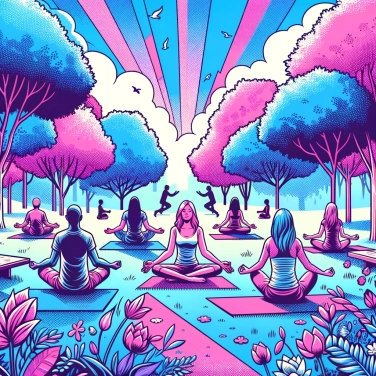Exposure to natural light influences our internal biological clock by regulating the production of melatonin, the sleep hormone. When we receive adequate exposure to natural light during the day, it promotes a good wake-sleep cycle.

Your body has a sort of internal clock, called the circadian rhythm, which regulates your periods of wakefulness and sleep. This internal clock is heavily influenced by external light, especially sunlight. As soon as it gets light out, a particular light enters your eyes and sends a direct message to your brain, like "Hey, it's morning, wake up!" This light information helps synchronize your biological rhythm with the day. When night falls, the gradual absence of natural light signals to your body that it’s time to slow down and prepare for sleep. If you stay indoors all day without enjoying daylight, your internal clock completely loses track and doesn't know when it's time to be awake or asleep, which can seriously harm the quality of your sleep.
Natural light is directly responsible for hormonal regulation related to sleep, particularly through the secretion of melatonin, an essential hormone for good sleep. When you expose your eyes to daylight in the morning, your brain understands that it's time to reduce melatonin to start the day well. Then, at dusk, the lack of natural light sends an opposite signal: it gently triggers the production of melatonin, preparing your body for sleep. Regular exposure also helps stabilize the production of serotonin, a hormone involved in mood regulation and promoting the state of relaxation necessary for good nighttime rest. Conversely, if you spend too much time indoors or exposed to intense artificial lights in the evening, this hormonal regulation can quickly go awry and disrupt your sleep cycle.
Your body loves changes in light to know when to activate certain functions. Bright, clear light in the morning acts as a sort of "on" button that boosts your energy and alertness. In contrast, a softer, dimmer light in the evening becomes an essential signal to prepare your brain for the night. Natural variations in light allow your internal clock to clearly identify day and night. When these variations are muddled, your sleep can end up being disturbed or poor quality. Without clear cues, your sleep can become restless, light, or hard to achieve. Respecting these light transitions throughout the day helps your body enter deeper, restorative, and regular sleep more easily.
Exposing yourself to natural light every day helps to set your internal clock, which clearly makes it easier to fall asleep in the evening. The principle is simple: daylight signals to your body that it’s time to stay awake, while the evening darkness invites your body to slow down. The greater the contrast between these two signals, the more easily your melatonin — the sleep hormone — is triggered at nightfall. As a result, you fall asleep faster, without tossing and turning for hours under the covers. Moreover, regular exposure to sunlight doesn’t necessarily mean sunbathing for hours: 30 minutes outdoors each day, especially in the morning or around noon, already makes a big difference.
Expose yourself to natural light for at least 30 minutes a day, ideally in the morning to best regulate your biological rhythm. Keep the curtains open upon waking so your body can directly capture daylight and naturally enter "wake" mode. If you work indoors, try to position yourself near a window to maximize your exposure to sunlight during your office hours. Reduce the use of bright artificial lights one hour before bedtime, especially those high in blue light (screens, strong LED lamps), to help facilitate your sleep onset. Finally, keep your bedroom dark at night to allow for better melatonin secretion and thus enjoy more restorative and deep sleep.
Natural light acts as a primary signal for your internal biological clock, allowing it to clearly distinguish between day and night, thus improving your wake-sleep cycle.
Sleeping in complete darkness maximizes the quality of your rest, as even a slight exposure to light during the night can disrupt your deep sleep and the feeling of recovery upon waking.
The use of electronic devices that emit blue light before sleeping can disrupt the production of melatonin, the sleep hormone, thus delaying the onset of sleep. This is an additional reason to turn off your screens at least one hour before going to bed.
Even on cloudy days, spending time outdoors during the day can provide enough natural light to positively influence your internal biological rhythm. So don’t hesitate to go for a little walk!
Yes, the lack of natural light during winter can lead to a condition known as seasonal affective disorder, characterized by increased fatigue, sleep difficulties, and a decline in overall mood, partly due to a disruption in the production of melatonin and serotonin.
Even though some full-spectrum or light therapy lamps can partially compensate for the lack of natural light, they do not completely replace it, as the intensity and specific light spectrum of natural sunlight are particularly beneficial for synchronizing our body's biological functions.
Common signs include difficulty falling asleep, frequent awakenings during the night, a persistent feeling of fatigue during the day, difficulty waking up in the morning, and a depressed mood.
It is advisable, in the evening, to avoid or limit exposure to bright lights and the blue light emitted by screens, as they delay the secretion of melatonin and disrupt the natural process of falling asleep. Opt for a dim ambiance and warm lighting in the hours leading up to bedtime.
A daily exposure of at least 20 to 30 minutes, ideally in the morning, is generally sufficient to regulate one's circadian rhythm and improve the quality of nighttime sleep.

No one has answered this quiz yet, be the first!' :-)
Question 1/5